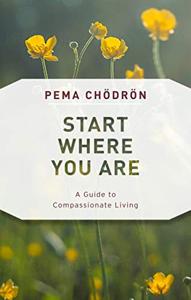
Want to learn the ideas in Start Where You Are better than ever? Read the world’s #1 book summary of Start Where You Are by Pema Chodron here.
Read a brief 1-Page Summary or watch video summaries curated by our expert team. Note: this book guide is not affiliated with or endorsed by the publisher or author, and we always encourage you to purchase and read the full book.
Video Summaries of Start Where You Are
We’ve scoured the Internet for the very best videos on Start Where You Are, from high-quality videos summaries to interviews or commentary by Pema Chodron.
1-Page Summary of Start Where You Are
Overview
Meditation has been proven to improve daily happiness and calm the mind. The shamatha-vipashyana school of Buddhist meditation is particularly useful for first time meditators, as it is among the simplest and most accessible schools. It can help you rein in your mind’s darker side, helping you bring more tranquility into your life. In these key points, you’ll learn how to practice shamatha-vipashyana meditation; what tonglen breathing is and how it can help both you and those you care about; and why the Buddhist concept of emptiness (Nirvana) is compatible with quantum physics.
Big Idea #1: Meditation can help bring peace of mind by keeping you focused on the present.
What is it about meditation that people find so useful? Meditation helps you focus on the present moment, which can help you become more content. Many of us spend too much time living in the past or worrying about the future, but when we live in the now and avoid those concerns, we are happier.
This is what the simple yet powerful shamatha-vipashyana meditation technique can bring you. It comes from Buddha, who said that meditation should have tranquility and insight.
There are two steps to practicing shamatha-vipashyana meditation. The first is focusing on your breathing, which you can do by sitting upright and being aware of your surroundings. Be mindful of what’s going on around you, but focus most of your attention on the rise and fall of your breath. This will help keep you in the present moment because this is all there really is. It also helps to stop thinking about worries or regrets from the past or future as they’re not real anyway so it won’t matter if they occupy some space in our minds for a while.
Big Idea #2: Maintain a joyful mind by not taking life so seriously and by looking for ways to shake things up.
Throughout our lives, we struggle with our sense of obligation to others and ourselves. We are either excited about what possibilities we have or disappointed that we didn’t live up to expectations. Sometimes when people wake up in the morning they feel hopeful and ready for the day while at other times they feel fear of failure or disappointment because they had too many drinks the night before.
Most of us make our lives more stressful than they need to be. We often feel like life will end if we don’t get a promotion or do something else that is important to us.
Meditation can help you live in the now. Once you get familiar with meditation, it should become part of your regular daily life.
This also means you can choose to be joyful. Life is just a collection of little moments, and you can meet these moments with joy or sorrow in your heart.
One of the best ways to find joy in life is to change up your routine. You can do this by trying new things and being open to new experiences. For example, if you’re in the shower, sing a song instead of just standing there! Or try making breakfast for dinner or riding your bike to work instead of taking public transportation. It’s all about finding opportunities for joy around every corner and looking at things with fresh eyes. Instead of greeting every moment with the same baggage, find opportunities for joy around every corner.
Big Idea #3: Free yourself from judgments by embracing emptiness.
If you’re familiar with Buddhism, then you probably know that the ultimate spiritual goal is called nirvana. It’s often translated as emptiness. To Western ears, this term has a very negative connotation; however, psychologically speaking, it can be a great relief to feel empty or free of attachments.





